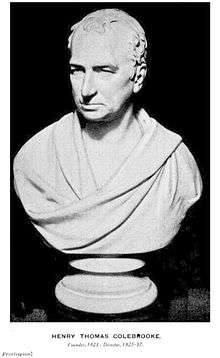Henry Thomas Colebrooke
| Henry Thomas Colebrooke | |
|---|---|
 A bust of Henry Thomas Colebrooke currently owned by the Royal Asiatic Society | |
| Born |
June 15, 1765 London, England |
| Died |
April 10, 1837 (aged 71) London, England |
| Nationality | British |
| Occupation | Orientalist |
| Known for | Sanskrit scholar, one of the founders of the Royal Asiatic Society |
Henry Thomas Colebrooke FRS FRSE (June 15, 1765 – March 10, 1837) was an English orientalist and mathematician. He has been described as "the first great Sanskrit scholar in Europe".[1]
Biography
Henry Thomas Colebrooke, third son of Sir George Colebrooke, 2nd Baronet, Chairman of the East India Company, and Mary Gaynor of Antigua, was born in London. He was educated at home; and when only fifteen (15) he had made considerable attainments in classics and mathematics. From the age of twelve to sixteen he resided in France.
In 1782 Colebrooke was appointed to a writership in India. About a year after his arrival there he was placed in the board of accounts in Calcutta; and three years later he was removed to a situation in the revenue department at Tirhut. In 1789 he was removed to Purneah, where he investigated the resources of that part of the country, and published his Remarks on the Husbandry and Commerce of Bengal, privately printed in 1795, in which he advocated free trade between Great Britain and India.
He was sent to Nagpur in 1799 on a special mission, and on his return was made a judge of the new court of appeal, over which he afterwards presided. In 1805, Lord Wellesley appointed him honorary professor of Hindu law and Sanskrit at the college of Fort William. He became a member of council in 1807 and returned to England seven years later.
He was a director of the Royal Asiatic Society, and many of the papers in the society's Transactions were communicated by him. In 1822 he was elected the second president of the Royal Astronomical Society.
Works
After eleven years' residence in India, Colebrooke began the study of the Sanskrit language; and to him was entrusted the translation of the major Digest of Hindu Laws, a monumental study of Hindu law which had been left unfinished by Sir William Jones. He translated the two treatises, the Mitacshara of Vijnaneshwara and the Dayabhaga of Jimutavahana, under the title Law of Inheritance. During his residence at Calcutta he wrote his Sanskrit Grammar (1805), some papers on the religious ceremonies of the Hindus, and his Essay on the Vedas (1805), for a long time the standard work in English on the subject.
- The Agriculture and Commerce of Bengal (1792)
- Bible translations into Persian Calcutta (1804)
- Kosha, Or Dictionary of the Sanscrit Language by Umura Singha with an English Interpretation and Annotations by H.T. Colebrooke. (1807)
- Algebra, with Arithmetic and mensuration: from the Sanscrit of Brahmegupta. By Brahmagupta, Bhāsakārācārya. (translated by Colebrooke 1817)
- Miscellaneous Essays. (1837) London: W.H. Allen & Company.
- On the Religion and Philosophy of the Hindus. (published 1858) London: Williams & Norgate.
- Translated Mithakshara into English
A posthumous essay on his father's life was published by Sir T. E. Colebrooke in 1873 as part of a reprinting of Miscellaneous Essays.
Family
Colebrooke married Elizabeth Wilkinson in 1810. The marriage was short-lived and she died in 1814.[3]
References
Further reading
- Buckland, C. E., ed. (1906). "Colebrooke, Henry Thomas" in Dictionary of Indian Biography. London: Swan Sonnenschein & Company.
- Colebrooke, Thomas E. (1873). "Life of Colebrooke" in Frederick Max Müller's Chips from a German Woodshop, (1875). Vol. IV, pp. 377–317. London: Longmans, Green & Company.
- Higgenbothom, J.J. (1874). "Colebrooke, Henry Thomas" in Men Whom India Has Known: Biographies of Eminent Indian Characters. Madras: Higgenbothom & Company.
- Rocher, Rosane and Ludo (2011). The Making of Western Indology: Henry Thomas Colebrooke and the East India Company. London: Routledge for the Royal Asiatic Society. ISBN 978-0415336017